Last days of British empire in Argentina .. and Canada too?
Jun 22nd, 2012 | By Counterweights Editors | Category: Canadian Republic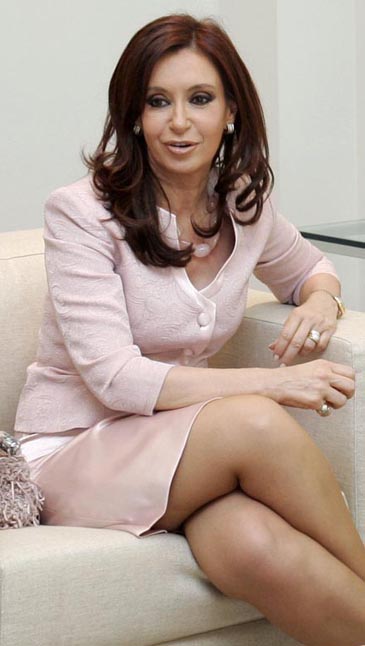
Cristina Fernandez de Kirchner, current president of Argentina (and widow of former president, Nestor Kirchner) ranks among the hottest world leaders – which is more than can be said for David Cameron (or Stephen Harper).
Current Argentine president Cristina Kirchner, widow of former Argentine president Nestor Kirchner, is viewed by many observers of such things as one of the “Hottest Female World Leaders” extant.
So you might think that when she and UK Prime Minister David Cameron bumped into each other at the G20 summit in Los Cabos, Mexico, earlier this week, he could come up with something warmer than urging “her to respect the right of [the some 3,000] Falkland Islanders [off the southern coast of Argentina] to choose their own future in an upcoming referendum that is expected to show overwhelming opposition to Argentinian rule.”
(And the other side of this opposition among the few thousand current Falklands inhabitants is expected to be support for carrying on as “British” residents of an old strategic South Atlantic outpost of the British empire.)
Not surprisingly, President Kirchner “countered” Mr. Cameron “by citing UN resolutions calling for sovereignty negotiations” over the island territories (known as “Islas Malvinas” in Argentina). And “Argentinian Foreign Minister Hector Timmerman … accused Britain of disrespecting UN resolutions and of retaining an imperialist mindset … ‘After years of acting as a colonial power they have forgotten that they are responsible for the existence of colonialism, and that it is countries like Argentina that defeated most of the colonial projects in the world.’”
Whatever happens in the referendum, in 2012 it seems clear enough that British rule over these territories in Argentinian waters cannot last forever. Earlier this year, to take just one of many cases in point, the American actor Sean Penn argued that “Britain’s continuing hold on the Falklands was ‘colonialist, ludicrous and archaic‘.”
For a little while longer, David Cameron may be able to repeat some variation on Margaret Thatcher’s “Falklands War” trick of 30 years ago, in a United Kingdom that could stand some unifying foreign adventure once again. Yet, one way or another, the last days of the British empire in Argentina are in the air. And on similar broad currents of world history, there have been two parallel recent signs that Stephen Harper’s sentimental last gasps of the British monarchy in Canada, and the nostalgic imperial echoes of its anglospheric colonized minds, are drawing within sight of their best-before dates as well.
In Canada today 67%Â “want a new, elected person to replace the Governor General and lieutenant governors”
To start with the first sign, Kelly McParland at the National Post, eg, has just made fun of an opinion poll commissioned by the Democracy Watch founder Duff Conacher’s new group “Your Canada, Your Constitution – Involving Canadians in their democracy.”
According to McParland: “The YCYC survey, conducted by Harris/Decima from May 10th through May 20th, asked 2,030 Canadians ages 18 or older whether they wanted clear rules that would be enforced by the Supreme Court of Canada to regulate the powers of the Governor General and provincial lieutenant governors.”
With a monarchist oligarch’s customary contempt for the wisdom of the common people, Kelly McParland finds it amusing that 65% of those polled “pretended” to support “clear rules” of this sort: “Oh come on,” he says: “If 65% of Canadians can even name the Governor General (hint: it’s not Adrienne Clarkson), much less any of the lieutenant governors (and explain what the difference is) I’d be shocked.”
Yet McParland also notes but does not make fun of or otherwise further mention the companion survey finding that 67% of those polled “want a new, elected person to replace the Governor General and lieutenant governors.”
That no doubt is because when this popular democratic reform finally is adopted in Canada (as it has already been in other comparable parliamentary democracies), we will be unalterably on the road to completing what the Osgoode Hall law professor Brian Slattery has called “the long process of decolonization that Canada has undergone since 1867.”
(And at the very end of this road there no doubt will be no practical room for Mr. McParland’s British monarchy in Canada, and/or the repressive old colonial cliques and family compacts, etc, etc – federally and provincially – that this institution still serves and protects.)
Charles Roach’s “Freedom Five” move ahead with Canadian citizenship oath court case
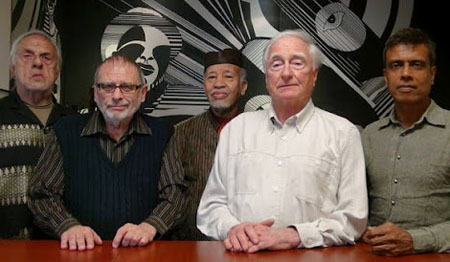
Charles Roach’s “Freedom Five” – l to r: Howard Gomberg, Randall White, Charles Roach, Michael McAteer, and Ashok Charles : fighting for a Canadian citizenship oath that does not force new citizens who agree with the republican side of the debate among old citizens to pretend to support the British monarchy in Canada anyway, in violation of the right to freedom of conscience in the Canadian Charter of Rights and Freedoms.
In part two of the current Canadian anti-imperialist drama, it was announced this past Monday that Madam Justice C.J. Horkins of the Ontario Superior Court of Justice has decided Canadian civil rights lawyer Charles Roach’s “Freedom Five” may proceed with their Charter of Rights challenge to remove a compulsory oath to the British monarchy in Canada from the Canadian Citizenship Act – despite continuing objections from Stephen Harper’s federal department of the Attorney General.
As also reported by the National Post, Mr. Roach (who has now lived in Canada for some 57 years) “says he does not judge the hundreds of thousands of new Canadians who do pledge their allegiance (including his wife, from Trinidad, who took the oath when she became a Canadian citizen). But he argues that there should be a choice.”
At a time when an increasingly vigorous democratic public debate about the future of the British monarchy in Canada is gathering steam (partly as a result of Mr. Harper’s current efforts to force the fading institution down various reluctant throats), this only seems fair.
The Freedom Five are fighting for a Canadian citizenship oath that does not compel new citizens who agree with the republican side of the growing debate among old citizens, to pretend to support the British monarchy in Canada anyway, in violation of the right to freedom of conscience in the Canadian Charter of Rights and Freedoms.
The continuing joys of British imperial nostalgia in Canada and the Commonwealth today (a musical interlude)
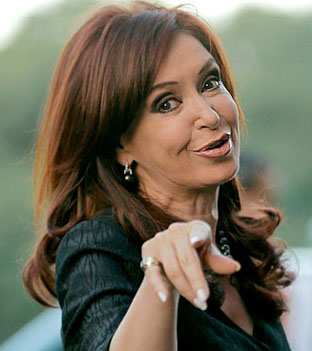
Cristina Fernandez de Kirchner, president of Argentina, once commented that “grilled pork is better than Viagra for sex.”
To support both the 67% of 2012 Canadians who “want a new, elected person to replace the Governor General and lieutenant governors,” and the Freedom Five’s quest for a Canadian citizenship oath that respects the diverse political convictions of all of us who are already Canadian citizens, does not mean denigrating the benefits that the embryonic global civilization of the British empire did bring to Canada, once upon a time.
As the former Australian prime minister John Howard has said: “A lot of Australians can accept that we ought to become a republic because it is the next most logical thing to do, but they won’t accept we ought to become a republic because what’s gone before is inferior.”
The British empire did similarly bequeath some undoubted heritage treasures to what is now the (almost) independent and “free and democratic” bilingual and multicultural country of Canada – not the least of which is our current “Westminster” parliamentary democratic political culture.
There is also much harmless British imperial nostalgia still abroad in especially English-speaking Canada – and other parts of what is now the Commonwealth of Nations (the most dominant part of which nowadays, demographically and in many other ways, is the Republic of India). Here are some magical modern You Tube samples of the great imperial invention of the British military band, and its assorted variations in other parts of the world:
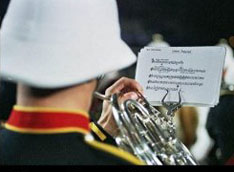 * IMPERIAL ECHOES : This earlier 20th century British march captures much of the mood of the empire on which the sun never dared to set in its sunset – as still remembered by more than a few Canadians still alive today. As the Wikipedia entry on the subject explains: “Imperial Echoes (1913) is the title of a piece for solo piano by Arnold Safroni that was later adapted as a military march and became well-known through its frequent use on BBC radio [in the UK and worldwide] during the Second World War and beyond.” Here is the “Classic BBC Radio Theme” version from the Second World War and beyond on You Tube. Here is a much more recent performance by a well established community band in Cornwall in the UK: “Mount Charles Band – ‘Imperial Echoes’ – Bugle Band Contest 2011.” And here is a (not all that well recorded but similarly recent) performance by a group from the former British Mediterranean colony now known as the Republic of Malta : “Malta Police Band plays Imperial Echoes – Military Tattoo 2011.” The term also figured in an article posted on this website just over a half-dozen years ago: “Imperial echoes .. holding onto your brains in the UK, US, and Ontario (and Australia too).” And according to a source reported in this article, the march ‘Imperial Echoes’ was “so popular that when the Canadian Broadcasting System began its inaugural TV broadcasts in 1953 the theme was once again used in connection with the nightly news” in Canada.
* IMPERIAL ECHOES : This earlier 20th century British march captures much of the mood of the empire on which the sun never dared to set in its sunset – as still remembered by more than a few Canadians still alive today. As the Wikipedia entry on the subject explains: “Imperial Echoes (1913) is the title of a piece for solo piano by Arnold Safroni that was later adapted as a military march and became well-known through its frequent use on BBC radio [in the UK and worldwide] during the Second World War and beyond.” Here is the “Classic BBC Radio Theme” version from the Second World War and beyond on You Tube. Here is a much more recent performance by a well established community band in Cornwall in the UK: “Mount Charles Band – ‘Imperial Echoes’ – Bugle Band Contest 2011.” And here is a (not all that well recorded but similarly recent) performance by a group from the former British Mediterranean colony now known as the Republic of Malta : “Malta Police Band plays Imperial Echoes – Military Tattoo 2011.” The term also figured in an article posted on this website just over a half-dozen years ago: “Imperial echoes .. holding onto your brains in the UK, US, and Ontario (and Australia too).” And according to a source reported in this article, the march ‘Imperial Echoes’ was “so popular that when the Canadian Broadcasting System began its inaugural TV broadcasts in 1953 the theme was once again used in connection with the nightly news” in Canada.
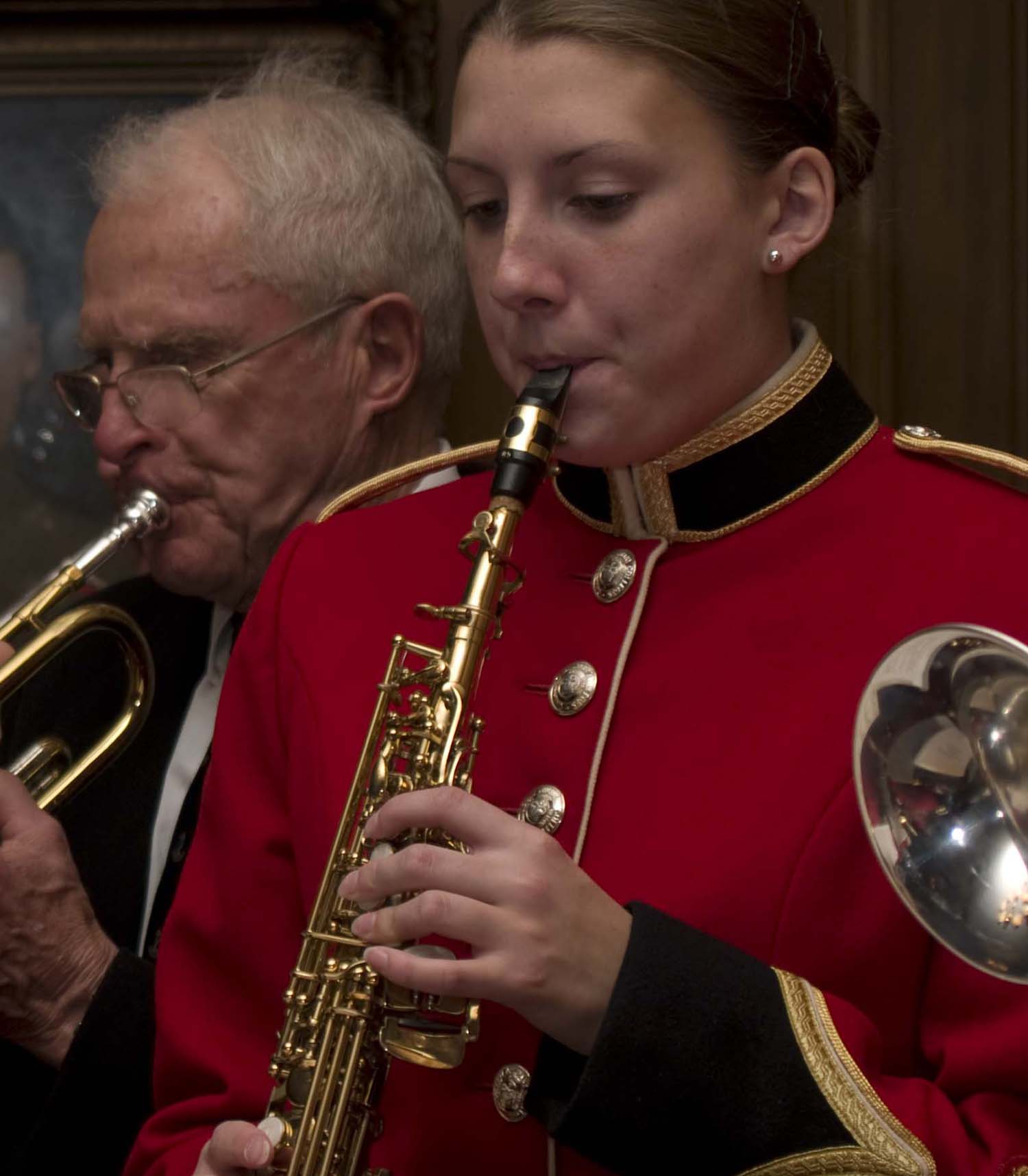 * CANADIAN MILITARY BANDS : Opinion polls regularly and understandably show that the British monarchy in Canada is less popular in Canada’s French-speaking majority province of Quebec than anywhere else in the country. As a sign that British imperial nostalgia is nonetheless not entirely unknown among the first people who called themselves Canadians, check out “Canadian Army Drill Show … Jun 8, 2008 … La Musique du Royal 22e Régiment and Drill team du 2e Bataillon du Royal 22e Régiment.” For something closer to the English-speaking mainstream try “Canadian International Military Tattoo 2011 – Massed Pipes & Drums and Military Bands … Copps Coliseum, Hamilton, ON, 25 June 2011.” If you are a Canadian musician wondering about the prospects of earning a steady living in a still rough rugged country you might want to consult “Military Musicians in the Canadian Forces.” And for some sense of new directions in Canadian military music today see “Canadian Forces Band … Footage taken at the Thomas & Mack Centre on April 16th 2011 at the Las Vegas International Tattoo.”
* CANADIAN MILITARY BANDS : Opinion polls regularly and understandably show that the British monarchy in Canada is less popular in Canada’s French-speaking majority province of Quebec than anywhere else in the country. As a sign that British imperial nostalgia is nonetheless not entirely unknown among the first people who called themselves Canadians, check out “Canadian Army Drill Show … Jun 8, 2008 … La Musique du Royal 22e Régiment and Drill team du 2e Bataillon du Royal 22e Régiment.” For something closer to the English-speaking mainstream try “Canadian International Military Tattoo 2011 – Massed Pipes & Drums and Military Bands … Copps Coliseum, Hamilton, ON, 25 June 2011.” If you are a Canadian musician wondering about the prospects of earning a steady living in a still rough rugged country you might want to consult “Military Musicians in the Canadian Forces.” And for some sense of new directions in Canadian military music today see “Canadian Forces Band … Footage taken at the Thomas & Mack Centre on April 16th 2011 at the Las Vegas International Tattoo.”
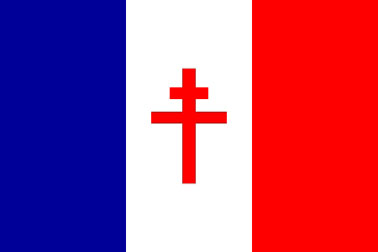
Flag of the Free French Forces under the leadership of General Charles de Gaulle during the Second World War, with the Cross of Lorraine in red on the traditional tricoleur of the French Republic.
* MARCHE LORRAINE : Canada’s French heritage also arguably draws attention (or should) to a great march of fame from the French military music repertoire. Back during the Second World War, when the BBC was playing ‘Imperial Echoes,’ the Cross of Lorraine was the emblem of Charles de Gaulle’s Free French Forces. Winston Churchill later quipped about his Second World War experience that “of all the crosses I had to bear the heaviest was the Cross of Lorraine.” But he appreciated and respected what de Gaulle was doing all the same. ‘Marche Lorraine’ had been written in 1892 by Louis Ganne. Here are four different versions on You Tube : by the band of the historic Cheshire Regiment in the UK (allied with the Nova Scotia Highlanders in Canada and the Rajputana Rifles in India) ; in a vocal version by the French singer Georges Thill ; by the band of La Garde Républicaine in France ; and, much more recently, by the Albany State University Symphonic Band in the USA.
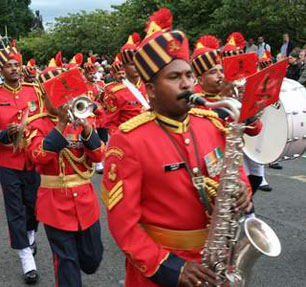 * INDIAN MILITARY BANDS : The Commonwealth of Nations is what the old British empire has evolved into in the 21st century. The parliamentary democratic Republic of India has about half the people in the Commonwealth today, and plays an increasingly important role in the organization’s operation. Like Canada it has retained some ties to the old military music culture of the British empire, while also pouring its own new wine into the old bottles. A half-dozen different You Tube postings illustrate the evolving dynamics of this intriguing case: “INDIAN NAVAL BAND – ‘Jai Bharati’, Conducted by M.S.Neer,VSM,LMME-LTC, 1983-84” ; “Indian Army band at 2008 Edinburgh Tattoo … Indian Army Band takes part in the Edinburgh Tattoo for the first time since Independence in 1947″” ; “Amazing Grace Territorial Army Symphony Band …Â 2009… (India Gate New Delhi)” ; “Commonwealth games 2010 closing ceremony New Delhi – Indian Army, Air Force and Navy bands ; Indian Territorial Army Band Display – India Gate Oct 2011 ; “Royal Air Force and Indian Air Force bands Perform at India Gate, New Delhi … 03rd March 2012.”
* INDIAN MILITARY BANDS : The Commonwealth of Nations is what the old British empire has evolved into in the 21st century. The parliamentary democratic Republic of India has about half the people in the Commonwealth today, and plays an increasingly important role in the organization’s operation. Like Canada it has retained some ties to the old military music culture of the British empire, while also pouring its own new wine into the old bottles. A half-dozen different You Tube postings illustrate the evolving dynamics of this intriguing case: “INDIAN NAVAL BAND – ‘Jai Bharati’, Conducted by M.S.Neer,VSM,LMME-LTC, 1983-84” ; “Indian Army band at 2008 Edinburgh Tattoo … Indian Army Band takes part in the Edinburgh Tattoo for the first time since Independence in 1947″” ; “Amazing Grace Territorial Army Symphony Band …Â 2009… (India Gate New Delhi)” ; “Commonwealth games 2010 closing ceremony New Delhi – Indian Army, Air Force and Navy bands ; Indian Territorial Army Band Display – India Gate Oct 2011 ; “Royal Air Force and Indian Air Force bands Perform at India Gate, New Delhi … 03rd March 2012.”
More on “elected person to replace the Governor General” (or just electing the Governor General) in Canada
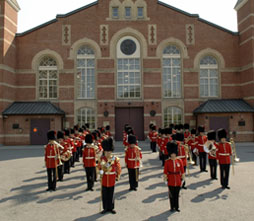
The Regimental Band of the Governor General’s Foot Guards was formed in Ottawa in 1872 with the inception of the Regiment, which serves as Canada’s senior Infantry Militia unit.
It is hard to know just what to make of Duff Conacher’s new group, “Your Canada, Your Constitution – Involving Canadians in their democracy” at this very early stage in its development. From various things he has said himself, and from the official list of initial supporters, it is not exactly meant to promote a Canadian republic (a cause that we do warmly support on this website).
The group was nonetheless launched with some fanfare in Ottawa this past June 4. (See “New educational charity — Your Canada, Your Constitution — launches today with free afternoon conference and evening reception in Ottawa … Andrew Cohen and other leading commentators speaking at conference on Canada’s constitutional democracy issues.”)
It also seems clear enough that “YCYC” is committed to serious democratic reform of the office of governor general in Canada. And this is a cause that we warmly support as well. (We agree that, in the shorter term, you can democratically reform the office of governor general without quite turning Canada into a republic. But we believe that this kind of reform can only be a half-way house to a longer-term republican future. And we think it is an important practical reform for republicans to focus on right now!)
Over the past several years we have posted a number of articles on the importance of serious democratic reform of the office of governor general in Canada on this site. See, eg:
* “The other republicans : way down south in the Land of Oz,” Nov 13th, 2006 ;
* “March 6 referendum in Iceland: one model for democratizing governor general in Canada,” Feb 24th, 2010 ;
* “Electing governor general is only option that finally makes sense,” Apr 14th, 2010 ;
* “If step-by-step reform is good for the Senate, why not the monarchy too?” Jan 6th, 2012.
More on the Canadian citizenship oath court case
New Canadian citizens could also be given a choice about including a reference to the British monarchy in their Canadian citizenship oath, without turning Canada into any kind of republic.
As Ontario Justice Edward Belobaba noted in an earlier decision on Charles Roach’s citizenship oath Charter challenge: “Mr. Roach and the proposed class of similarly situated applicants say that the requirement in the Canadian citizenship oath ‘to be faithful and bear true allegiance to Her Majesty the Queen’ violates their freedoms of conscience, speech, and association as guaranteed by ss. 2 (a), (b) and (d) of the Charter of Rights and Freedoms, and their equality rights under s. 15 (1) of the Charter … the applicant is not challenging the fact that Her Majesty the Queen is Canada’s head of state … The applicant and the proposed class of litigants are challenging the content of the citizenship oath … There is nothing in the Constitution Act that requires a Canadian oath of citizenship or that a new citizen must swear allegiance to the Queen … in Australia, also a constitutional monarchy, new citizens are required to take a ‘pledge of commitment’ to ‘Australia and its people…and laws.’Â This ‘pledge of commitment’ makes no reference to Her Majesty the Queen.’”
(Australia’s citizenship oath did at one time include a reference to the British monarch. But it was removed in the early 1990s by the Australian Labor Party government of Paul Keating.)
We would nonetheless agree that giving new citizens an option to include a reference to the historic constitutional monarchy or not in their citizenship oath could be consistent with some gradual evolution towards a Canadian republic in the longer term (or even mid term?) future. And over the past several years we have posted at least two articles that directly focus on the now rather long legal journey of Charles Roach’s citizenship oath Charter challenge :
* “Why is the Attorney General of Canada so keen to shut down Roach vs. the Queen?” May 20th, 2007 ;
* “Even the best Senators make mistakes : Bill S-231 and the Canadian citizenship oath,” Apr 6th, 2008.
Media Briefing/Update from Charles Roach’s law office – Tuesday, June 19, 2012
Ontario Superior Court of Justice rules the Constitutional challenge to remove the Oath to Monarchy from the Canadian Citizenship Act may proceed.
Lawyer Charles Roach of the FREEDOM 5 plaintiff’s (Charles Roach, Howard Gomberg, Michael McAteer, Ashok Charles and advisor Randall White) have received permission to proceed with their legal case to remove the Oath to Monarchy from the Citizenship Act.
Madam Justice C.J. Horkins of the Ontario Superior Court of Justice on Monday June 18, 2012 concluded: “The plaintiffs may proceed by application or statement of claim to seek the declaratory relief that is articulated in the proposed claim.”
Lawyer Charles Roach and fellow FREEDOM 5 plaintiff’s case to proceed was heard by Madam Justice Horkins on May 29, 2012, and she provided her written conclusion on Monday, June 18, 2012.
Roach 78, has been fighting for equal opportunities for Canadian Immigrants since arriving here from Trinidad 57 years ago.
As a citizen of the former British Colony of Trinidad which became a Independent in 1962 and a Republic in 1976; he has refused to swear or affirm the oath to Queen Elizabeth II and her heirs and successors and indeed any form of Monarchial government based upon his (and likewise his fellow Freedom 5 plaintiff’s) own personal conscience which he asserts is protected by the Canadian Charter of Rights and Freedoms.
According to Mr. Roach: “I won’t take an oath (or affirmation) to be faithful and bear true allegiance to the Queen, her Son nor her Grandson, William; is there no freedom of conscience in Canada? Thousands of immigrants to Canada are forced to take this oath yearly to become citizens, even though they do not truly believe in it or do not understand the gravity of their oath or affirmation.”
Madam Justice Horkins denied the ATTORNEY GENERAL OF CANADA’s motion to dismiss Mr. Roach’s and fellow plaintiff’s case for delay. And she ordered pursuant to s. 7 of the class proceedings act, the individual claims may proceed…
Madam Justice Horkins ruled: “By the end of September (2012), the parties will agree on a timetable for moving the proceedings forward.”
For more Information contact: Reuben Abib – 416-657-1465 or 647-764-2315 or reuben@roachschwartz.com.
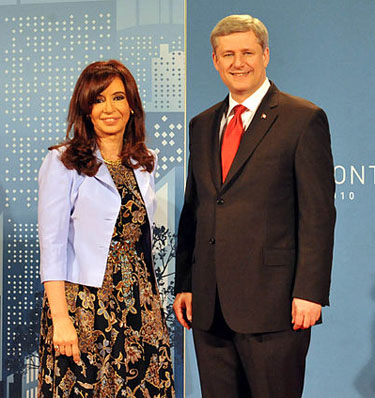
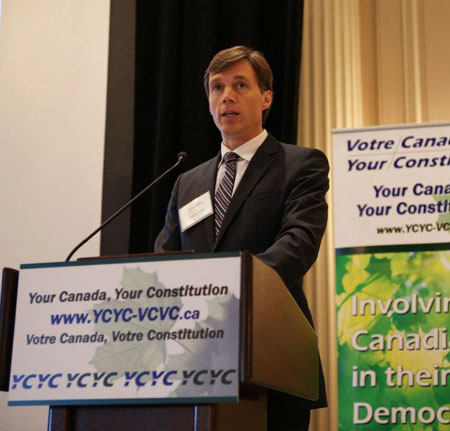
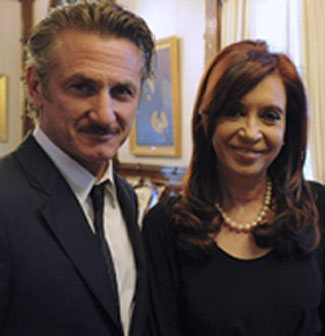
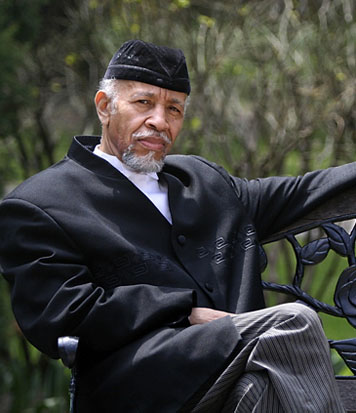
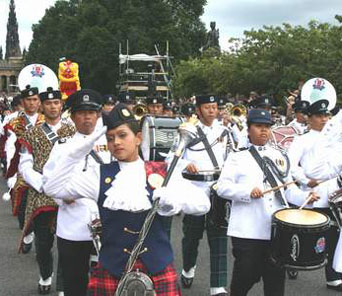
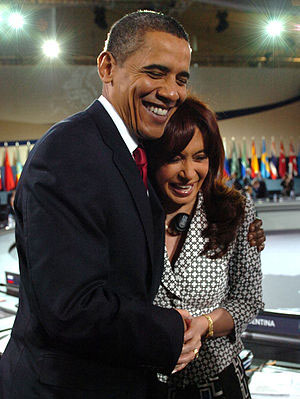


When you start to quote Sean Penn, the argument is lost.
You’re just letting your musty old anglosphere prejudices hang out Jimbo old sport. In the world today a lot more people agree with Sean Penn than agree with you. Cheers.
Shouldn’t we let the people of the Falklands decide who should govern them?
Aren’t the people of the Falklands just part of the people of Argentina?